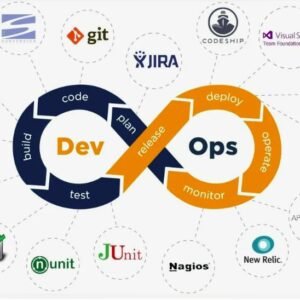“software development” has become increasingly familiar. It refers to the process of creating, designing, and maintaining software applications. But why is software development essential in our modern technological landscape? Let’s delve into the intricacies of this dynamic field.
Definition of Software Development
Software development encompasses a set of activities that involve the conception, design, testing, and maintenance of software products. It is a multifaceted discipline that goes beyond just writing code.
Significance in the Modern Technological Landscape
software development plays a pivotal role in shaping our technological landscape. It is the backbone of innovation, powering everything from mobile apps to complex artificial intelligence systems.
Evolution of Software Development

Historical Perspective
The journey of software development dates back to the early days of computing when programming languages were rudimentary, and tasks were labor-intensive. Over time, it has evolved into a sophisticated and systematic process.
Key Milestones
From the invention of high-level programming languages to the advent of agile methodologies, the milestones in software development have been transformative. Each innovation has paved the way for more efficient and collaborative practices.
Importance of Software Development
Facilitating Innovation
Software development is at the forefront of technological innovation. It empowers businesses and individuals to create groundbreaking solutions, fostering progress across various industries.
Enhancing Efficiency
In a world where time is of the essence, software development optimizes processes, automates tasks, and improves overall efficiency. It allows businesses to stay competitive and adapt to rapidly changing markets.
Enabling Digital Transformation
The digital era demands constant adaptation. Software development is the catalyst for digital transformation, enabling businesses to embrace new technologies and stay relevant in a dynamic environment.
Key Stages in Software Development

Planning and Requirements Analysis
Before a single line of code is written, thorough planning and requirements analysis are crucial. This stage sets the foundation for the entire development process.
Design and Prototyping
The design phase involves creating a blueprint for the software. Prototyping allows for user feedback, ensuring the final product aligns with user expectations.
Coding and Implementation
The heart of software development lies in coding. Skilled developers translate design into functional code, bringing the software to life.
Testing and Quality Assurance
Rigorous testing is essential to identify and rectify any bugs or issues. Quality assurance ensures the software meets the highest standards.
Deployment and Maintenance
The deployment phase marks the release of the software. Maintenance involves continuous updates, bug fixes, and improvements to keep the software current.
Trends in Modern Software Development
Agile Methodology
Agile methodologies prioritize flexibility and collaboration, allowing for iterative development. This approach is instrumental in responding to changing requirements.
DevOps Practices
DevOps integrates development and operations, promoting collaboration and efficiency throughout the software development lifecycle.
Artificial Intelligence Integration
The integration of artificial intelligence is reshaping software development, enabling the creation of intelligent and adaptive applications.
Challenges in Software Development
Security Concerns
As software becomes more sophisticated, security threats increase. Developers must prioritize robust security measures to protect user data.
Rapid Technological Advancements
Staying abreast of technological advancements is challenging. Continuous learning is essential for developers to remain competitive.
Team Collaboration
Effective collaboration is vital, especially in large-scale projects. Communication and teamwork are crucial to overcoming challenges and ensuring project success.
The Role of Software Development in Various Industries

Healthcare
In the healthcare industry, software development contributes to electronic health records, medical imaging, and telemedicine, improving patient care and operational efficiency.
Finance
Financial institutions rely on software development for secure and efficient transactions, risk management, and the development of innovative financial products.
Education
In education, software development supports e-learning platforms, educational apps, and management systems, transforming the way we learn and teach.
Entertainment
From video games to streaming platforms, software development is the driving force behind the entertainment industry’s technological advancements.
Future Prospects of Software Development
Emerging Technologies
The future of software development holds promises of emerging technologies like blockchain, quantum computing, and extended reality.
Potential Innovations
Innovations such as low-code development and edge computing are poised to revolutionize the way we approach and execute software development.
Case Studies
Successful Software Development Stories
Examining successful case studies provides valuable insights into the strategies and practices that lead to positive outcomes.
Lessons Learned
Analyzing failures and challenges in software development offers valuable lessons for developers and organizations.
How to Get Started in Software Development

Educational Paths
Various educational paths, including formal degrees, coding bootcamps, and online courses, cater to individuals aspiring to enter the field.
Essential Skills
Developers need a combination of technical and soft skills, including problem-solving, communication, and adaptability.
Resources and Tools
Access to resources and tools, such as programming languages, frameworks, and development environments, is essential for aspiring developers.
Ethical Considerations in Software Development
Privacy Concerns
The ethical implications of software development include considerations for user privacy and data protection.
Responsible AI Implementation
Developers must approach the integration of artificial intelligence responsibly, considering the potential societal impacts.
Final Thoughts:
Recap of Software Development's Importance
In summary, software development is the driving force behind technological progress, fostering innovation, efficiency, and digital transformation.
Looking Towards the Future
As technology continues to evolve, the future of software development holds exciting possibilities, shaping the way we live, work, and interact.
FAQs
Coding is the process of translating design into functional software. It is a fundamental aspect of software development, allowing developers to create the intended functionality.
Yes, anyone with dedication and a willingness to learn can embark on a journey in software development. Various educational paths cater to individuals with diverse backgrounds.
Software development contributes to business growth by enhancing efficiency, enabling digital transformation, and fostering innovation, ultimately providing a competitive edge in the market.
Coding bootcamps offer an accelerated and immersive learning experience, making them a viable option for individuals seeking a faster entry into the field of software development.
Software developers face ethical challenges related to user privacy, data security, and responsible implementation of artificial intelligence, requiring a thoughtful and responsible approach.








